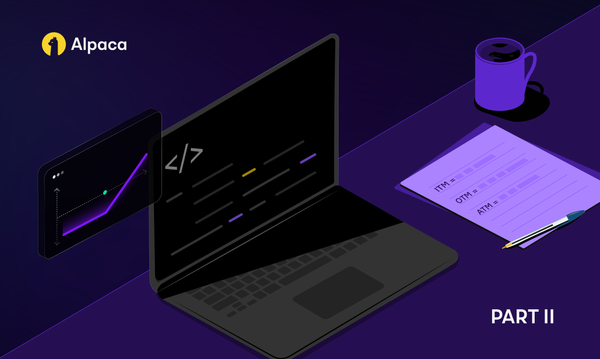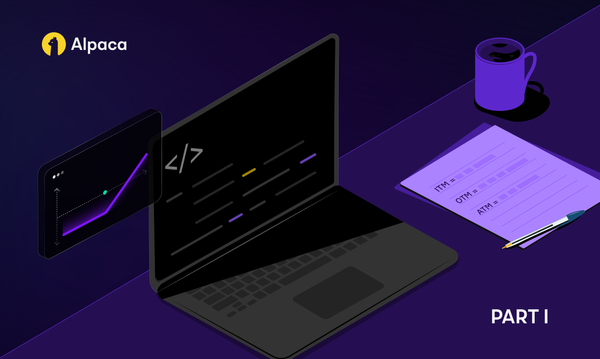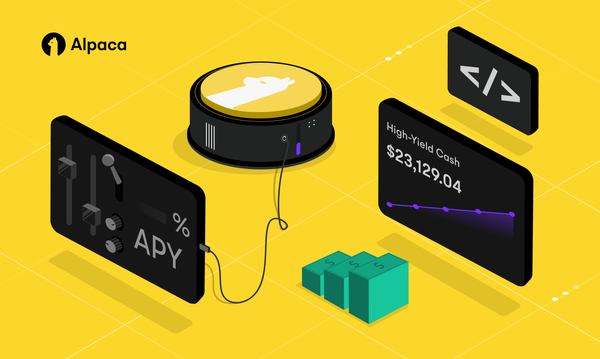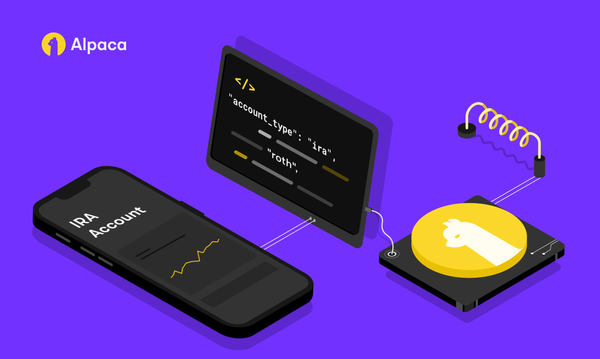Crypto Trading APIs Are Powering a Crypto App Development Boom
Crypto APIs make crypto trading application development easier, faster, and cheaper by letting application developers plug into already existing platforms.


Please note that this article is for educational and informational purposes only. The views and opinions expressed are those of the author. Alpaca does not recommend any specific securities, cryptocurrencies or investment strategies.
If you follow crypto, you know that the number and variety of crypto trading platforms and applications are growing exponentially. There’s one thing in particular that makes this exponential expansion possible — crypto trading APIs.
An API is an application programming interface. Crypto APIs make crypto trading application development easier, faster, and cheaper by letting application developers plug into already existing platforms.
If developers of crypto trading platforms had to reinvent the wheel for every new application, growth would be linear. Thankfully, developers don’t have to start from scratch; they can build an entire application around third-party crypto APIs.
Providers of crypto trading APIs give developers a toolkit of API programs that can be plugged into an application. These APIs allow other applications to reach out across the internet and tap into vast resources such as trading features, crypto prices and histories, charting features, technical analysis tools, and much more. These crypto APIs can be used to leverage real-time data to build crypto trading bots, conduct academic research, or test trading software. These are just a few of the myriad of possibilities.
Each of the various APIs focuses on specific types of clients and offers specific features. For example, while some offer buying and selling functionality, others focus only on providing data or analysis tools.
Who uses crypto trading APIs?
Developers of some of the most robust crypto trading and market intelligence platforms use crypto APIs to maximize their resources. However, there are also individual traders and smaller teams that develop proprietary trading applications that inform and sometimes execute their trading strategies. Large enterprises like banks can also leverage crypto APIs to add new crypto-specific features.
What features and functions do crypto APIs enable?
Trading APIs are available for all types of trading platforms — stocks, bonds, commodities, fiat currencies, and cryptocurrencies.
In addition to providing access to historical market data such as price and volume, market data APIs can also be used to add functionality to any crypto trading platform such as graphic charting features, technical analysis tools, news data, screening tools, and capabilities for buying and selling cryptocurrencies.
Another feature that some API providers offer is testing environments in which their customers can run trading algorithms in a “sandbox” to test for accuracy.
Crypto trading platforms that offer APIs
So who offers crypto APIs? Scores of crypto trading developers offer collections of APIs with all manner of functionality. If you’re looking for the most comprehensive list of crypto APIs, you’ll want to check out SyncWith.com’s list of crypto investing APIs, which currently includes 108 different crypto APIs.
With so many crypto APIs on the market, choosing the right one can be daunting. We’ve made a list of popular crypto API platforms that offer both free (limited access) plans and paid plans at various levels.
CoinMarketCap
CoinMarketCap’s API is extremely popular. CoinMarketCap specializes in serving up price and volume data for cryptocurrencies for both algotrading and for enterprise platform developers. This API is one of the biggest aggregate sources of crypto data. CoinMarketCap also offers an exchange API. Its data API is used by Coinbase and Investors Business Daily.[¹][²]
Coinbase
Coinbase is a top centralized cryptocurrency exchange. Their powerful API offers six different functions, including Wallet API, Coinbase Connect or Oauth2, Wallet Notifications, Merchant Checkouts, Coinbase Exchange API, and Toshi. The Coinbase crypto trading API is limited to four cryptocurrencies — Bitcoin, Bitcoin Cash, Litecoin, and Ethereum’s Ether coin.[¹][²][³][⁴]
CoinGecko
CoinGecko’s focus is cryptocurrency categorization and rankings. They offer a variety of comprehensive analysis tools. CoinGecko provides market stats for Twitter, Reddit, Facebook, and several other internet giants. Its branded market data API is free to use.[¹][³][⁴]
Messari
Messari collects data for thousands of cryptocurrencies and provides clients with analysis tools. Messari offers users the ability to create personalized screeners to filter cryptocurrencies by restricting the range of factors such as market cap, price, volume, and much more. Messari also offers trading functionality.[¹]
Alpaca
Alpaca’s real-time crypto investing API allows traders to buy and sell crypto with a few lines of code. We support market, limit, and stop-limit orders for BTC, BCH, ETH, and LTC. The ability to place fractional orders is also handy. Alpaca also offers paper trading and live trading, both with real-time market data, plus a useful testing environment where crypto traders can test their algorithms before fully deploying them. We also offer SDKs available in Python, NET/C#, Go, Node, and more.
Considerations for selecting crypto trading APIs
The first and most important question to ask about an API is whether it offers the desired functionality. Developers should look beyond functions that they need to incorporate today and consider those that they might want to add in the future.
Many crypto APIs offer multiple features and options. Alternatively, a developer might choose to build around a very specific type of crypto API with a narrow range of functionality.
When choosing an API plan, developers must determine how much information or the volume of trading they plan on supporting. Some APIs can only handle limited trade volume or bandwidth. Some only cover a handful of cryptocurrencies while others support several.
The usability of an API is another factor to consider. Some APIs are easy for beginners to use, while others make more sense for serious developers who want complete control over their platforms. Still, the usability of APIs seems to be constantly improving, and they'e becoming easier to use over time.
Pricing is also a major factor. Crypto API pricing spans a wide gamut from free to expensive — sometimes hundreds of dollars per month. For large platform developers, the fees are usually modest. However, prices may vary based on the number of requests made each month, so scalability is a key factor when looking at pricing.
Timing is everything in trading. While some applications only need recent market data, trading applications usually require real-time data. Some applications also require more historical data than others in order to make reliable recommendations.
The future of crypto APIs
Blockchain technology and cryptocurrencies are still in their infancy, and crypto trading is even newer to the world at large. Even so, we’re seeing a veritable Cambrian Explosion of crypto trading and intelligence platforms enabled by crypto trading APIs and algorithms. New capabilities are being added daily and many have yet to be conceived.
It’s important for developers to think not just for today, but for the future. With this space changing so rapidly, if a company isn’t ahead of the curve, it’s likely to fall behind.
References
- Top 10 Cryptocurrency APIs for Developers and Investors in 2022
- Best cryptocurrency APIs of 2022 (full review)
- Best Crypto APIs for Trading, Data Collection, & More - Apipheny
- 19 Top Cryptocurrency APIs & Free Alternatives List - February, 2022 | RapidAPI
Please note that this article is for informational purposes only. The example above is for illustrative purposes only. Actual crypto prices may vary depending on the market price at that particular time. Alpaca Crypto LLC does not recommend any specific cryptocurrencies.
Cryptocurrency is highly speculative in nature, involves a high degree of risks, such as volatile market price swings, market manipulation, flash crashes, and cybersecurity risks. Cryptocurrency is not regulated or is lightly regulated in most countries. Cryptocurrency trading can lead to large, immediate and permanent loss of financial value. You should have appropriate knowledge and experience before engaging in cryptocurrency trading. For additional information please click here.
Cryptocurrency services are made available by Alpaca Crypto LLC ("Alpaca Crypto"), a FinCEN registered money services business (NMLS # 2160858), and a wholly-owned subsidiary of AlpacaDB, Inc. Alpaca Crypto is not a member of SIPC or FINRA. Cryptocurrencies are not stocks and your cryptocurrency investments are not protected by either FDIC or SIPC. Please see the Disclosure Library for more information.
This is not an offer, solicitation of an offer, or advice to buy or sell cryptocurrencies, or open a cryptocurrency account in any jurisdiction where Alpaca Crypto is not registered or licensed, as applicable.




